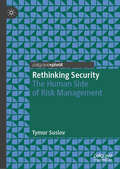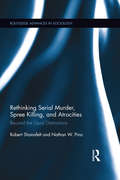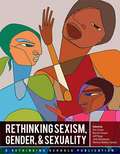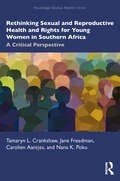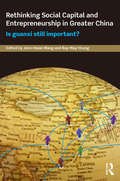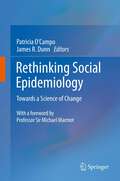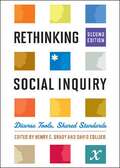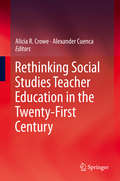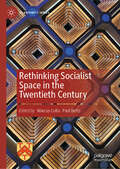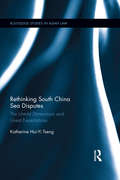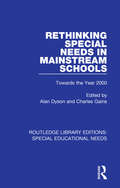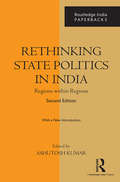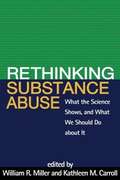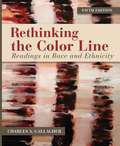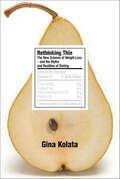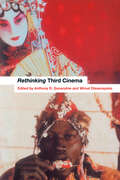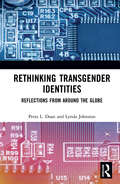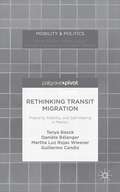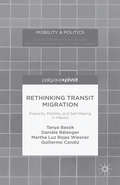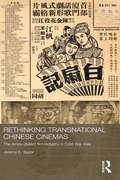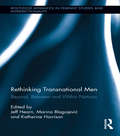- Table View
- List View
Rethinking Security: The Human Side of Risk Management (Crime Prevention and Security Management)
by Tymur SuslovThis short Pivot argues for a paradigm shift towards a human-centric approach, emphasising the importance of understanding and managing human behaviour as a fundamental aspect of effective security strategies. It explores the intersection of psychology, criminology, and security, providing a comprehensive framework for integrating behavioural insights into security practices. The book questions the dependence on technology solutions and provides a new viewpoint, emphasising human behaviour as the core cause of security challenges. It explains complex psychological and criminological insights and provides straightforward explanations of psychological and criminological ideas that are critical to comprehending security issues. It advocates for paradigm shift in security practices and encourages a move from control-based to cooperative security paradigms.
Rethinking Serial Murder, Spree Killing, and Atrocities: Beyond the Usual Distinctions (Routledge Advances in Sociology #140)
by Nathan W. Pino Robert ShanafeltMultiple killings by serial or spree killers and the mass violence seen in war crimes and other atrocities have typically been understood as discrete category types, which can foster the view that there are fundamentally different kinds of human beings, including "deviants" who are born evil and innately given to sadism or a callous lack of empathy. In contrast, this book considers the violence of these "deviants" in terms of larger questions about human violence. Therefore, in addition to describing the life histories of a sample of individual serial and spree murderers, the book includes analysis of macro-level phenomena such as genocide, mass rape and killing, and torture occurring under conditions of war, state authorization, or political upheaval. The chief claim of the book is that, given the "right" combination of factors occurring at different levels of analysis, virtually anyone can emerge as a killer or perpetrator of atrocities. While it is crucial to understand individual killers in terms of the details of their biographies, it is equally crucial to understand political atrocities in terms of the details of their histories; and to see that persons and groups are always the product of complexly interacting assemblage processes.
Rethinking Sex: A Provocation
by Christine EmbaPart searing examination, part call to arms—a bold case against modern sexual ethics, from young Washington Post columnist Christine Emba.For years now, modern-day sexual ethics has held that &“anything goes&” when it comes to sex—as long as everyone says yes, and does so enthusiastically. So why, even when consent has been ascertained, are so many of our sexual experiences filled with frustration, and disappointment, even shame? The truth is that the rules that make up today&’s consent-only sexual code may actually be the cause of our sexual malaise—not the solution. In Rethinking Sex, reporter Christine Emba shows how consent is a good ethical floor but a terrible ceiling. She spells out the cultural, historical, and psychological forces that have warped our idea of sex, what is permitted, and what is considered &“safe.&” In visiting critical points in recent years—from #MeToo and the Aziz Ansari scandal, to the phenomenal response to &“Cat Person&”—she reveals how a consent-only view of sex has hijacked our ability to form authentic and long-lasting connections, exposing us further to chronic isolation and resentment. Reaching back to the wisdom of thinkers like Thomas Aquinas and Andrea Dworkin, and drawing from sociological studies, interviews with college students, and poignant examples from her own life, Emba calls for a more humane philosophy, one that starts with consent but accounts for the very real emotional, mental, social, and political implications of sex—even, she argues, if it means saying no to certain sexual practices or challenging societal expectations altogether. More than a bold reassessment of modern norms, Rethinking Sex invites us to imagine what it means to will the good of others, and in turn, attain greater affirmation, fulfillment, and satisfaction for ourselves.
Rethinking Sexism, Gender, And Sexuality
by Jody Sokolower Rachel Harper Jeff Sapp Kim Cosier Melissa Bollow TempelHow do you respond when a child asks, "Can a girl turn into a boy?" What if your daughter brings home school books with sexist, racist stories? What does "queering the curriculum" look like? What's wrong with "anti-bullying" policies? What are alternatives? <P><P> Rethinking Sexism, Gender, and Sexuality is a collection of inspiring stories about how to integrate feminist and LGBTQ content into curriculum, make it part of a vision for social justice, and create classrooms and schools that nurture all children and their families.
Rethinking Sexual and Reproductive Health and Rights for Young Women in Southern Africa: A Critical Perspective (Routledge Global Health Series)
by Jane Freedman Nana K. Poku Tamaryn Crankshaw Carolien AantjesThis important book provides a critical examination of the sexual and reproductive health and rights (SRHR) of young women and girls in Southern Africa, examining the ways in which current policies and programmes aimed at improving SRHR often fail to reach the most marginalised populations.Addressing key regional challenges such as high rates of HIV, unintended pregnancies, unsafe abortions, and sexual and gender-based violence, the book highlights how health inequalities in the region are in fact increasing, despite the 2030 Agenda for Sustainable Development of "leaving no one behind". The book draws on theoretical analysis and empirical data gathered from studies carried out in five Southern African countries (Madagascar, Mozambique, South Africa, Zambia, and Zimbabwe), arguing that a continued focus on HIV and interventions that target health in a narrow sense often fail to understand the wider socio-economic determinants of poor sexual and reproductive health and the ways in which girls and young women are made vulnerable. Written by leading scholars in the field, this will be essential reading for students and researchers in Global Health, International Development, Women’s Studies, and all related fields.
Rethinking Slave Rebellion in Cuba
by Aisha K. FinchEnvisioning La Escalera--an underground rebel movement largely composed of Africans living on farms and plantations in rural western Cuba--in the larger context of the long emancipation struggle in Cuba, Aisha Finch demonstrates how organized slave resistance became critical to the unraveling not only of slavery but also of colonial systems of power during the nineteenth century.While the discovery of La Escalera unleashed a reign of terror by the Spanish colonial powers in which hundreds of enslaved people were tortured, tried, and executed, Finch revises historiographical conceptions of the movement as a fiction conveniently invented by the Spanish government in order to target anticolonial activities. Connecting the political agitation stirred up by free people of color in the urban centers to the slave rebellions that rocked the countryside, Finch shows how the rural plantation was connected to a much larger conspiratorial world outside the agrarian sector. While acknowledging the role of foreign abolitionists and white creoles in the broader history of emancipation, Finch teases apart the organization, leadership, and effectiveness of the black insurgents in midcentury dissident mobilizations that emerged across western Cuba, presenting compelling evidence that black women played a particularly critical role.
Rethinking Social Capital and Entrepreneurship in Greater China: Is Guanxi Still Important? (Routledge Culture, Society, Business in East Asia Series)
by Ray-May Hsung Jenn-Hwan WangFamily networks and wider personal social relationships - guanxi - have long been held to be a significant factor making for the success of many Chinese family businesses, and guanxi is often seen as a special characteristic which shapes the nature of all business in China. This book re-examines this proposition critically, bringing together the very latest research and comparing the situation in different parts of "Greater China" – mainland China, Taiwan and Hong Kong. It considers entrepreneurship, venture capital, intergenerational succession, disputes, family businesses in different sectors of the economy, and particular family businesses. Among the book’s many interesting conclusions is the observation that guanxi capitalism has evolved in different ways in the different parts of Greater China, with the particular institutional setting having a major impact.
Rethinking Social Epidemiology
by James R. Dunn Patricia O’campoTo date, much of the empirical work in social epidemiology has demonstrated the existence of health inequalities along a number of axes of social differentiation. However, this research, in isolation, will not inform effective solutions to health inequalities. Rethinking Social Epidemiology provides an expanded vision of social epidemiology as a science of change, one that seeks to better address key questions related to both the causes of social inequalities in health (problem-focused research) as well as the implementation of interventions to alleviate conditions of marginalization and poverty (solution-focused research). This book is ideally suited for emerging and practicing social epidemiologists as well as graduate students and health professionals in related disciplines.
Rethinking Social Exclusion in India: Castes, Communities and the State (Routledge New Horizons in South Asian Studies)
by Minoru Mio and Abhijit DasguptaIn recent years exclusionary policies of the Indian state have raised questions concerning social harmony and economic progress. During the last few decades the emergence of identity politics has given new lease of life to exclusionary practices in the country. Castes, communities and ethnic groups have re-emerged in almost every sphere of social life. This book analyses different aspects of social exclusion in contemporary India. Divided into three sections – 1. New Forms of Inclusion and Exclusion in Contemporary India; 2. Religious Identities and Dalits; 3. Ethnicity and Politics of Inclusion and Exclusion in the North-eastern Frontier – the book shows that a shift has taken place in the discourse on inclusion and exclusion. Chapters by experts in their fields explore issues of inclusion and exclusion that merit special attention such as dalit identity, ethnicity, territoriality and minorities. Authors raise questions about developmental programmes of the state aimed at making India more inclusive and discuss development projects initiated to alleviate socio-economic conditions of the urban poor in the cities. As far as North-east region is concerned, the authors argue that there is a tendency to highlight the homogenizing nature of the Indian culture by stressing one history, one language, one social ethos. Diversity is hardly accepted as a social reality, which has adversely affected the inclusive nature of the state. Against this development the final part of the book looks at questions regarding ethnic minorities in the northeast. Offering new insights into the debate surrounding social exclusion in contemporary India, this book will be of interest to academics studying anthropology, sociology, politics and South Asian Studies.
Rethinking Social Inquiry: Diverse Tools, Shared Standards
by Henry E. Brady David CollierWith innovative new chapters on process tracing, regression analysis, and natural experiments, the second edition of Rethinking Social Inquiry further extends the reach of this path-breaking book. The original debate with King, Keohane, and Verba_now updated_remains central to the volume, and the new material illuminates evolving discussions of essential methodological tools. Thus, process tracing is often invoked as fundamental to qualitative analysis, but is rarely applied with precision. Pitfalls of regression analysis are sometimes noted, but often are inadequately examined. And the complex assumptions and trade-offs of natural experiments are poorly understood. The second edition extends the methodological horizon through exploring these critical tools. A distinctive feature of this edition is the online placement of four chapters from the prior edition, all focused on the dialogue with King, Keohane, and Verba.
Rethinking Social Studies Teacher Education in the Twenty-First Century
by Alicia R. Crowe Alexander CuencaIn this volume teacher educators explicitly and implicitly share their visions for the purposes, experiences, and commitments necessary for social studies teacher preparation in the twenty-first century. It is divided into six sections where authors reconsider: 1) purposes, 2) course curricula, 3) collaboration with on-campus partners, 4) field experiences, 5) community connections, and 6) research and the political nature of social studies teacher education. The chapters within each section provide critical insights for social studies researchers, teacher educators, and teacher education programs. Whether readers begin to question what are we teaching social studies teachers for, who should we collaborate with to advance teacher learning, or how should we engage in the politics of teacher education, this volume leads us to consider what ideas, structures, and connections are most worthwhile for social studies teacher education in the twenty-first century to pursue.
Rethinking Socialist Space in the Twentieth Century (St Antony's Series)
by Paul Betts Marcus CollaThis edited collection explores the problem of space under socialist regimes in the twentieth century. Bringing together contributions from international scholars with expertise in the architectural, urban, social, and cultural history of twentieth-century socialism, the book includes examples from China, Africa, Mongolia, Eastern Europe and the USSR. The volume reflects on how developments in the field over the past two decades have altered our understanding of how such spaces were constructed (both literally and discursively), how they could become sites of contested meanings, and how they were perceived outside the socialist world. Moreover, the volume is concerned with how scholarly approaches associated with post-colonialism, global history, gender history, and the ‘temporal’ and ‘sensory’ turns have reconfigured our knowledge of, and approach to, the history of socialist space.
Rethinking South China Sea Disputes: The Untold Dimensions and Great Expectations (Routledge Studies in Asian Law)
by Katherine Hui-Yi TsengThe proposed book draws on the on-going South China Sea dispute, and the multifaceted challenges wrought by the South China Sea issue that requires an inter-disciplinary perspective. It employs legal-analytical methods, to emphasize the nuances of the role and interpretation of international law and treaties by China in different periods, while taking into account policy and strategic concerns, which generally cast great sways in decision-making. The re-introduction of interdisciplinary concerns straddling law and history illustrates that the historical dimension, which has long been neglected, is an emerging concern that poses looming dangers that may unexpectedly radicalize the friction. Contributing to debunking the mystique wrought by confrontations between a historical and a law-dominated perspective, these perspectives are supported by a more nuanced analytical framework, featuring theoretical concerns with a tinge of practicality. The South China Sea Dispute aims to unveil a nuanced evolution of the issue with a confluence of inter-temporal law, policy and maritime practices in the South China Sea.
Rethinking Special Needs in Mainstream Schools: Towards the Year 2000 (Routledge Library Editions: Special Educational Needs #16)
by Alan Dyson Charles GainsFirst published in 1993. This book critically analyses the state of provision for special needs, exploring the problems faced by practitioners and suggesting that the area is fraught with such tensions that a radical reconceptualization is necessary. It considers how the field may be rethought and developed over the next decade and presents examples of innovatory practice which point the way forward to future provision and which are illustrative of the themes raised throughout the book.
Rethinking State Politics in India: Regions within Regions
by Ashutosh KumarIn recent decades, India has been witness to the assertion of geographically, culturally and historically constituted distinct and well-defined regions that display ethnic, communal, caste and other social–political cleavages. This book examines the changing configurations of state politics in India. Focussing on identity politics and development, it explores the specificities of the regions within states — not merely as politico-administrative constructs but also as conceived in historical, geographic, economic, sociological or cultural terms. Adopting a comparative approach, the book looks at alternative theoretical approaches — the quest for homeland, identity, caste politics and public policy. This second edition includes a new Introduction that updates the research in the area, while further developing the theoretical framework. One of the first major volumes on federalism in India, including studies from across the nation, this book will be indispensable for students and scholars of political science, sociology, history and South Asian studies.
Rethinking Substance Abuse
by William MillerWhile knowledge on substance abuse and addictions is expanding rapidly, clinical practice still lags behind. This state-of-the-art book brings together leading experts to describe what treatment and prevention would look like if it were based on the best science available. The volume incorporates developmental, neurobiological, genetic, behavioral, and social-environmental perspectives. Tightly edited chapters summarize current thinking on the nature and causes of alcohol and other drug problems; discuss what works at the individual, family, and societal levels; and offer robust principles for developing more effective treatments and services.
Rethinking The Color Line: Readings In Race And Ethnicity
by Charles A. Gallagher<P>User-friendly without sacrificing intellectual or theoretical rigor, this anthology of current research examines contemporary issues and explores new approaches to the study of race and ethnic relations. <P>The featured readings effectively engage students by helping them understand theories and concepts. <P>Active learning in the classroom is encouraged while providing relevance for students from all ethnic, cultural, and economic backgrounds. The fifth edition features ten new articles on such timely topics as: <P> • The U.S. Census’ changing definition of race and ethnicity • Race-based disparities in health • Racial and gender discrimination among racial minorities and women • Being Arab and American • How social control maintains racial inequality • The increase in black and brown incarceration • How racial bias may affect the use of DNA to locate suspects of crimes • How derogatory ethnic and racial images are created and disseminated by the media • The sexualization of African American women through the use of gender stereotypes • The portrayal of light- and dark-skinned biracial characters
Rethinking The Subject: An Anthology Of Contemporary European Social Thought
by James FaubionSince the early 1970s, European thinkers have departed notably from their predecessors in order to pursue analytical programs more thoroughly their own. Rethinking the Subject brings together in one volume some of the most influential writings of Foucault, Habermas, Bourdieu, Pizzorno, Macfarlane, and other authors whose ideas have had a worldwide influence in recent social history.The anthology is testament to the central importance of three contemporary themes, each familiar to earlier thinkers but never definitively formulated or resolved. The first two concern the nature and modalities of power and legitimacy in society. The third, and most fundamental, deals with the nature and modalities of the ?self? or ?subject.?These themes owe their special contemporary relevance to an array of events?from the collapse of colonialism to the birth of test-tube babies. James Faubion's introduction traces the historical context of these influential events and themes. It also traces the lineaments of a still inchoate intellectual movement, of which the writers included in this anthology are the vanguard.
Rethinking Thin: The New Science of Weight Loss—and the Myths and Realities of Dieting
by Gina KolataIn this eye-opening book, New York Times science writer Gina Kolata shows that our society's obsession with dieting and weight loss is less about keeping trim and staying healthy than about money, power, trends, and impossible ideals.Rethinking Thin is at once an account of the place of diets in American society and a provocative critique of the weight-loss industry. Kolata's account of four determined dieters' progress through a study comparing the Atkins diet to a conventional low-calorie one becomes a broad tale of science and society, of social mores and social sanctions, and of politics and power.Rethinking Thin asks whether words like willpower are really applicable when it comes to eating and body weight. It dramatizes what it feels like to spend a lifetime struggling with one's weight and fantasizing about finally, at long last, getting thin. It tells the little-known story of the science of obesity and the history of diets and dieting—scientific and social phenomena that made some people rich and thin and left others fat and miserable. And it offers commonsense answers to questions about weight, eating habits, and obesity—giving us a better understanding of the weight that is right for our bodies.
Rethinking Third Cinema: The Role Of Anti-colonial Media And Aesthetics In Postmodernity (Kultur: Forschung Und Wissenschaft Ser. #13)
by Wimal Dissanayake Anthony R. GuneratneThis important anthology addresses established notions about Third Cinema theory, and the cinema practice of developing and postcolonial nations. The 'Third Cinema' movement called for a politicised film-making practice in Africa, Asia and Latin America, one which would take on board issues of race, class, religion, and national integrity. The films which resulted from the movement, from directors such as Ousmane Sembene, Satyajit Ray and Nelson Pereira dos Santos, are among the most culturally signficant, politically sophisticated and frequently studied films of the 1960s and 1970s. However, despite the contemporary popularity and critical attention enjoyed by films from Asia and Latin America in particular, Third Cinema and Third Cinema theory appears to have lost its momentum.Rethinking Third Cinema seeks to bring Third Cinema and Third Cinema theory back into the critical spotlight. The contributors address the most difficult and challenging questions Third Cinema poses, suggesting new methodologies and redirections of existing ones. Crucially, they also re-examine the entire phenomenon of film-making in a fast-vanishing 'Third World', with case studies of the cinemas of India, Iran and Hong Kong, among others.
Rethinking Transgender Identities: Reflections from Around the Globe
by Petra L. Doan Lynda JohnstonThis volume explores the diversity and complexity of transgender people’s experiences and demonstrates that gendered bodies are constructed through different social, cultural and economic networks and through different spaces and places. Rethinking Transgender Identities brings together original research in the form of interviews, participatory methods, surveys, cultural texts and insightful commentary. The contributing scholars and activists are located in Aotearoa New Zealand, Brazil, Canada, Catalan, China, Japan, Scotland, Spain, and the United States. The collection explores the relationship between transgender identities and politics, lived realities, strategies, mobilizations, age, ethnicity, activisms and communities across different spatial scales and times. Taken together, the chapters extend current research and provide an uthoritative state-of-the-art review of current research, which will appeal to cholars and graduate students working within the fields of sociology, gender studies, sexuality and queer studies, family studies, media and cultural studies, psychology, health, law, criminology, politics and human geography.
Rethinking Transit Migration: Precarity, Mobility, And Self-Making in Mexico (Mobility & Politics)
by Danièle Bélanger Tanya Basok Martha Luz Rojas Wiesner Guillermo CandizRethinking Transit Migration.
Rethinking Transit Migration: Precarity, Mobility, and Self-Making in Mexico (Mobility & Politics)
by Danièle Bélanger Tanya Basok Guillermo Candiz Martha Luz Rojas WiesnerQuestioning the notion of transit migration, the book examines factors that shape Central American migrants' mobility and immobility in the transnational space, comprised on Central American countries, Mexico, and the US.
Rethinking Transnational Chinese Cinemas: The Amoy-Dialect Film Industry in Cold War Asia (Media, Culture And Social Change In Asia Ser.)
by Jeremy E. TaylorThe Amoy-dialect film industry emerged in the 1950s, producing cheap, b-grade films in Hong Kong for direct export to the theatres of Manila Chinatown, southern Taiwan and Singapore. Films made in Amoy dialect - a dialect of Chinese - reflected a particular period in the history of the Chinese diaspora, and have been little studied due to their ambiguous place within the wider realm of Chinese and East Asian film history. This book represents the first full length, critical study of the origin, significant rise and rapid decline of the Amoy-dialect film industry. Rather than examining the industry for its own sake, however, this book focuses on its broader cultural, political and economic significance in the region. It questions many of the assumptions currently made about the ‘recentness’ of transnationalism in Chinese cultural production, particularly when addressing Chinese cinema in the Cold War years, as well as the prominence given to ‘the nation’ and ‘transnationalism’ in studies of Chinese cinemas and of the Chinese Diaspora. By examining a cinema that did not fit many of the scholarly models of ‘transnationalism’, that was not grounded in any particular national tradition of filmmaking and that was largely unconcerned with ‘nation-building’ in post-war Southeast Asia, this book challenges the ways in which the history of Chinese cinemas has been studied in the recent past.
Rethinking Transnational Men: Beyond, Between and Within Nations (Routledge Advances in Feminist Studies and Intersectionality #12)
by Jeff Hearn Katherine Harrison Marina BlagojevićThe world is becoming more transnational. This edited collection examines how the immense transnational changes in the contemporary world are being produced by and are affecting different men and masculinities. It seeks to shift debates on men, masculinities and gender relations from the strictly local and national context to much greater concern with the transnational and global. Established and rising scholars from Asia, Australia, Europe and North America explore subjects including economies and business corporations; sexualities and the sex trade; information and communication technologies and cyberspace; migration; war, the military and militarism; politics; nationalism; and symbolism and image-making.
